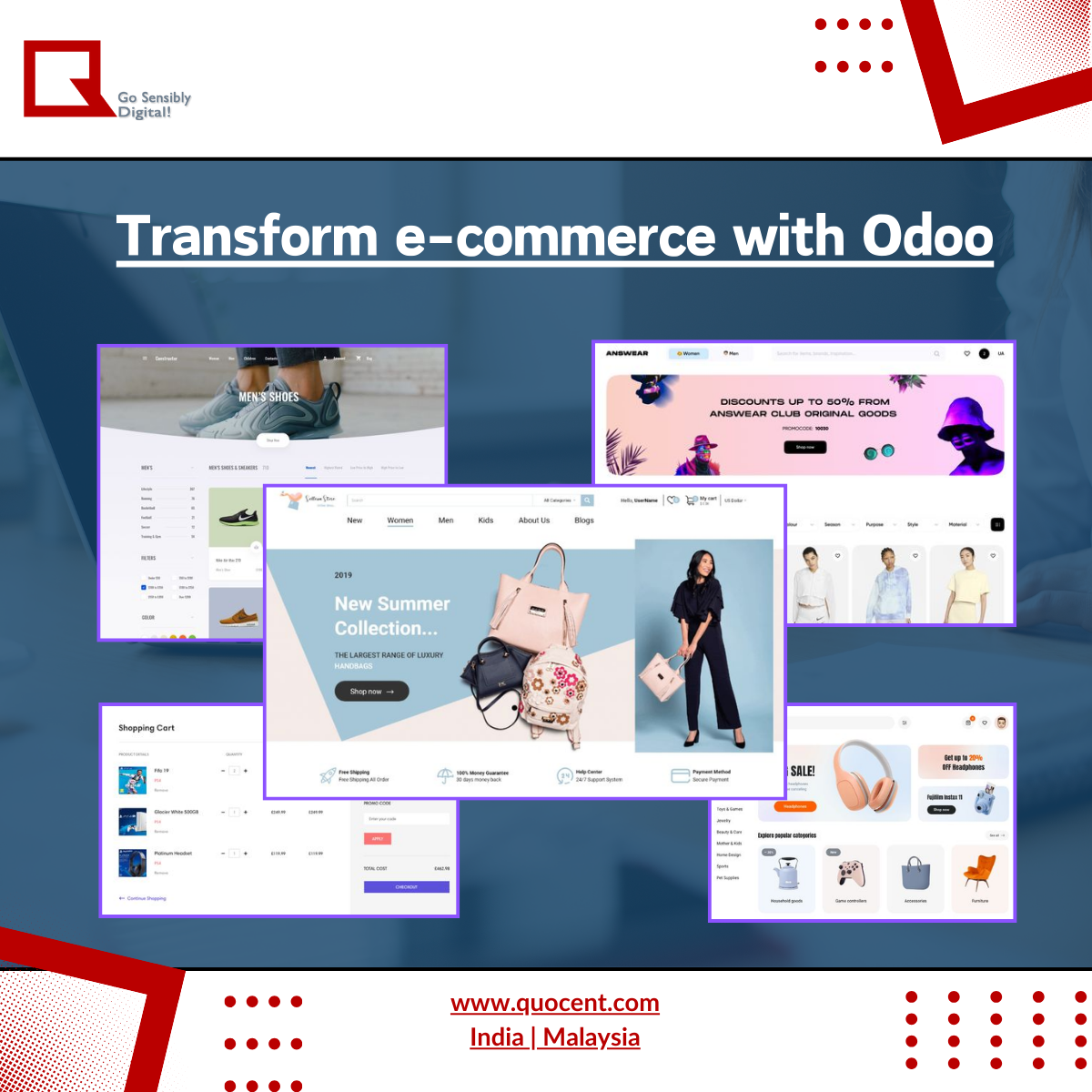With rapidly evolving e-commerce, a business needs more than just an online storefront to stay competitive. With the increasing demand for seamless customer experiences, inventory management, and multichannel selling, companies require integrated systems that can do it all. Odoo, a leading open-source business solution, has emerged as a game-changer for e-commerce businesses looking to streamline operations and scale effectively.
Unlike many standalone e-commerce platforms, Odoo provides a fully integrated ecosystem, making it a robust solution for businesses of all sizes. With over 7 million users worldwide, Odoo has proven itself as a reliable and scalable solution for e-commerce operations.
But why choose Odoo for E-Commerce?
Odoo’s e-commerce platform stands out because of its versatility and deep integration with other business processes. Here are a few reasons why businesses are turning to Odoo:
a. Seamless Integration
Odoo’s e-commerce module integrates seamlessly with its other apps, such as Inventory, Sales, Marketing, and Customer Relationship Management (CRM). This integration ensures that all your business operations are connected and automated, reducing the chances of manual errors and inefficiencies.
For instance, when an order is placed online, the inventory is automatically updated, sales teams are notified, and customers receive real-time updates on their orders. This seamless flow of information is crucial for businesses that aim to provide an efficient and hassle-free customer experience.
b. Customisation and Flexibility
Odoo is highly customisable, allowing businesses to tailor their e-commerce websites to reflect their brand and cater to specific customer needs. Whether you want to implement custom payment gateways, personalised product recommendations, or unique design elements, Odoo gives you the flexibility to build a platform that aligns with your business goals.
Odoo also supports third-party integrations, enabling businesses to connect with popular platforms like PayPal, Amazon, eBay, and FedEx, among others. This flexibility is ideal for businesses that need to operate across multiple channels and manage complex logistics.
c. Cost-Effective Solution
Compared to other proprietary e-commerce platforms, Odoo is a more cost-effective solution. Since Odoo is open-source, businesses have the flexibility to pay only for the modules they need, avoiding the high costs associated with bundled features that may not be necessary. This makes it an affordable choice for startups and small-to-medium enterprises (SMEs) looking for a powerful yet budget-friendly solution.
Key Features of Odoo for E-Commerce
Odoo’s e-commerce module comes with a range of features that make it an ideal choice for businesses in 2024. Let’s dive into the most impactful ones:
a. Responsive Website Builder
Odoo’s intuitive drag-and-drop website builder allows businesses to create mobile-optimised, user-friendly websites without any coding knowledge. With a range of themes and design options, you can easily create a visually appealing online store that drives engagement and conversions.
b. Multi-Channel Selling
Odoo simplifies multichannel selling by enabling you to manage sales from multiple platforms (such as your website, social media, and third-party marketplaces) in a single dashboard. This unified approach saves time and ensures that your inventory and sales data are synchronised across all platforms.
c. Real-Time Inventory Management
One of the standout features of Odoo’s e-commerce solution is its real-time inventory management system. When a customer places an order, Odoo automatically adjusts inventory levels, ensuring you never oversell or run out of stock unexpectedly. This feature is especially useful for businesses that manage a large volume of SKUs or operate across multiple warehouses.
d. Payment and Shipping Integration
Odoo supports multiple payment gateways and shipping providers, including Stripe, PayPal, DHL, and UPS. This ensures that customers have a variety of options to choose from during checkout, making it easier for businesses to cater to international customers as well.
e. Advanced Marketing Tools
Odoo’s marketing tools are designed to help businesses grow their customer base and boost sales. From email marketing to SEO optimisation and social media integration, Odoo provides the tools needed to attract new customers and retain existing ones. You can create promotional campaigns, set up abandoned cart reminders, and use upsell techniques to maximise revenue.
How Businesses Scale E-Commerce Operations using Odoo?
As your e-commerce business grows, managing increased sales volume, inventory, and customer data can become overwhelming. Odoo’s integrated system helps you scale operations smoothly by automating repetitive tasks, improving communication across departments, and providing real-time analytics.
For example, businesses can use Odoo’s Business Intelligence (BI) tools to track sales performance, identify best-selling products, and forecast demand. This allows companies to make data-driven decisions that can improve profitability and customer satisfaction.
Conclusion
In 2024, businesses looking to stay competitive in the fast-paced world of e-commerce need more than just a website—they need an integrated solution that connects all aspects of their operations. With Quocent, a business can use the flexible, cost-effective, and scalable features of Odoo that empowers e-commerce to streamline their processes, enhance customer experiences, and empower growth.



